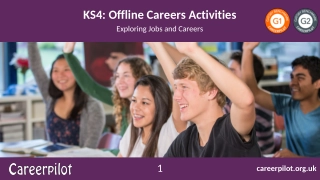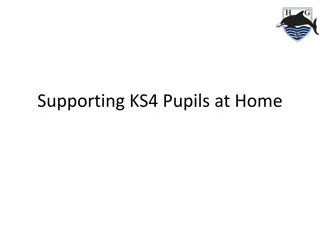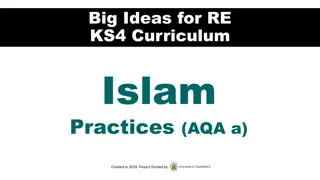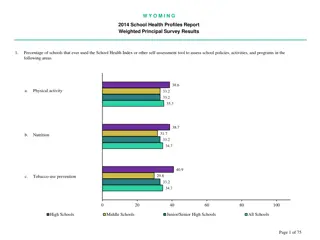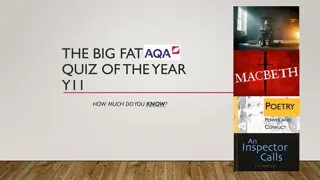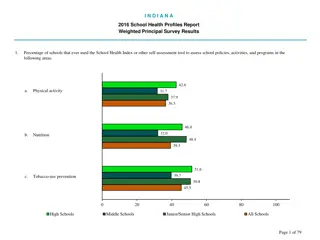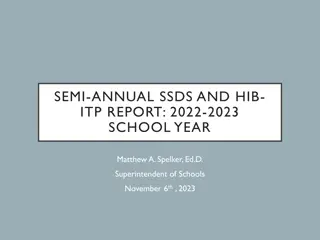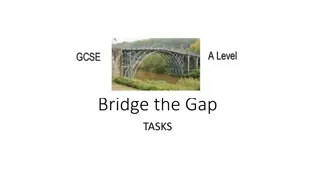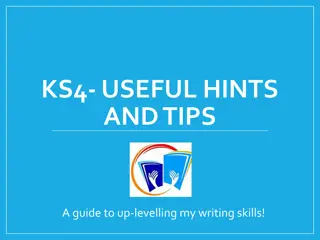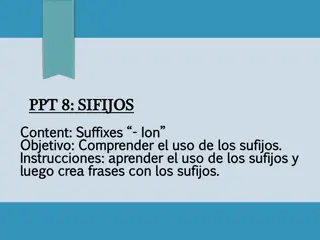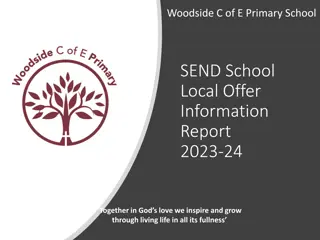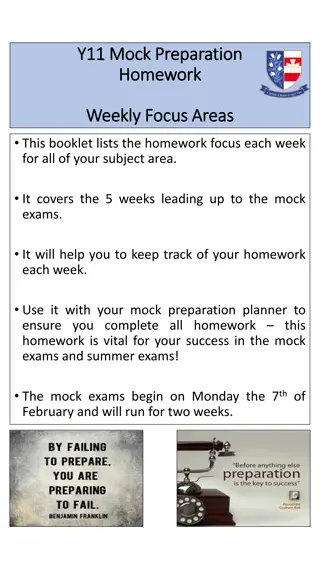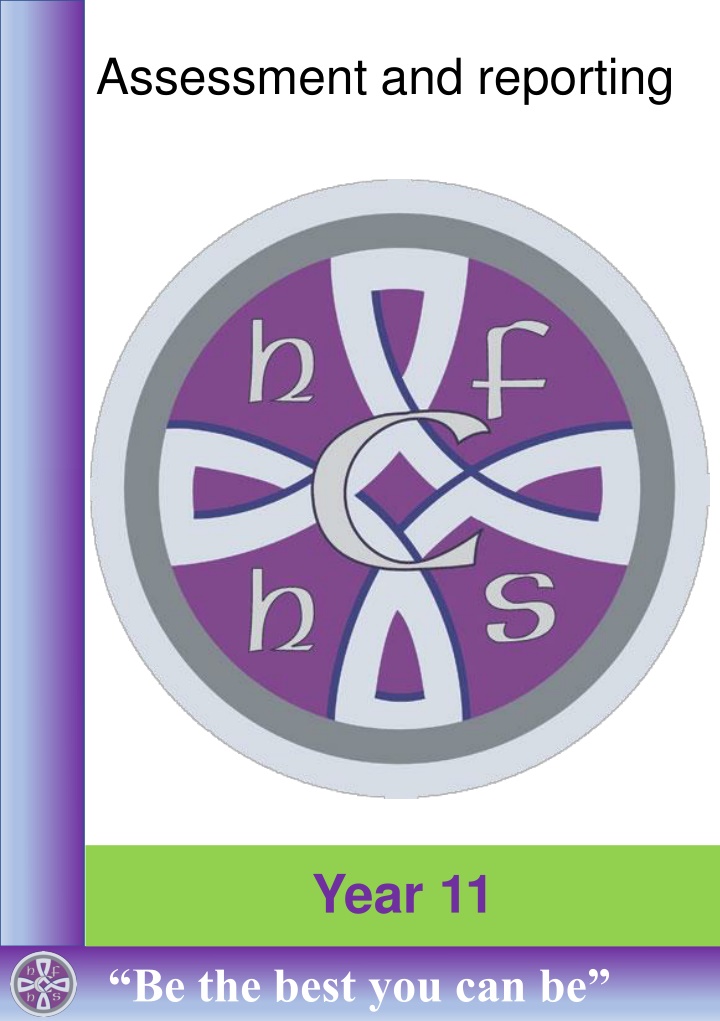
Guide for Year 11 Assessment and Reporting with GCSE Exam Support
This comprehensive guide for parents provides insight into Year 11 assessment principles, preparation for GCSE exams, and resources for supporting student learning and progress. It emphasizes the importance of assessment, formative assessments, and tailored support for academic growth.
Download Presentation

Please find below an Image/Link to download the presentation.
The content on the website is provided AS IS for your information and personal use only. It may not be sold, licensed, or shared on other websites without obtaining consent from the author. If you encounter any issues during the download, it is possible that the publisher has removed the file from their server.
You are allowed to download the files provided on this website for personal or commercial use, subject to the condition that they are used lawfully. All files are the property of their respective owners.
The content on the website is provided AS IS for your information and personal use only. It may not be sold, licensed, or shared on other websites without obtaining consent from the author.
E N D
Presentation Transcript
Assessment and reporting Year 11 Be the best you can be Be the best you can be
Revision Support The following resources are essential to help pupils prepare for GCSE examinations: https://www.gcsepod.com/ https://www.savemyexams.com/gcse/ https://www.tassomai.com/ https://www.freesciencelessons.co.uk/ https://senecalearning.com/en-GB/ https://www.physicsandmathstutor.com/physics-revision/# https://www.bbc.co.uk/bitesize/levels/z98jmp3 https://ukstudent.elevateeducation.com/ (password Rondo) Be the best you can be Be the best you can be
Introduction This booklet is a guide for parents so they can support their child s learning. This guide is to accompany your child s report and shows a snapshot of progress to date. We anticipate that parents will help their child work on the areas for development. In this booklet, teachers have included links to websites and other supporting documents to help you to support your child in improving their work and getting prepared for the GCSE examinations. The importance of assessment Valid and reliable assessment will inform teachers about how well pupils in their class have learnt a particular topic and whether any adaptations will be needed to their planning or curriculum design. Well-designed assessment should allow pupils to show how well they have learnt the knowledge taught. Pupils need to have learnt curriculum content sufficiently well in order to make progress. This is vital in preparing for the GCSE examinations. Grades in this report give a good indication of current progress. The grades are not predictions but where teachers have assessed pupils to be right now. What happens as a result of the assessment? Assessment data will inform teachers and pupils about strengths in their understanding and gaps in their knowledge. This can be seen in teacher feedback and pupil response in pupil books and assessments. This will allow both teacher and pupil to focus on areas for improvement. Be the best you can be Be the best you can be
Assessment principles Every subject specific curriculum is a planned progression model with knowledge built in depth and complexity lesson by lesson, topic by topic and year by year. Our assessment principles: All assessments are knowledge focused and test an accumulation of knowledge learnt throughout the year. Content taught in Year 10 and Year 11 will be regularly checked in Year 11 so that pupils are being asked to remember more. There will be a two mock examination sessions one in December and one in February/March. Pupils may be asked to more than one exam in a subject for example in science pupils will be asked to sit three exams in each mock series. Exams can vary in length from 50mins up to 2hrs. Pupils must prepare well for the mock examinations. Pupils will receive a revision list and links to the content being assessed this links closely to the exam board specification. Each assessment will use a variety of question types as directed by the exam board specification. Examples could include multiple choice, short and extended answers and the creation of a piece of work e.g., musical composition, painting or food dish. Be the best you can be Be the best you can be
Key terms Formative assessments Formative assessments have low stakes and carry no grade, which in some instances may discourage the pupils from doing the task or fully engaging with it. An example of a formative assessment might be asking pupils to draw a concept map in class to represent their understanding of a topic or to answer quiz questions or contribute their ideas on a mini-whiteboard. Summative assessments The goal of summative assessment is to evaluate pupil learning at the end of a topic by comparing it against some standard or benchmark. Summative assessments often have high stakes and are treated by the pupils as the priority over formative assessments. Mock Examinations Mock Exams are full practice papers for external examinations like GCSE's or BTEC's. They are vital because they allow for a complete check an accumulation of knowledge over a longer period of time. They: Ensure pupils revisit earlier material when studying for the real examinations. Have been shown to improve pupil performance because pupils remember more through repetition and revisiting. (Lawrence, 2013, Khanna, 2013). Take advantage of the testing effect the demonstration that repeated testing results in better learning than repeated studying. Are a form of retrieval practice a learning approach that emphasizes recalling rather than encoding information. Be the best you can be Be the best you can be
Understanding your childs report The report contains information as follows: Attendance and late to registration. Subject information including: Subject Teacher name Current working at grade (the grade best representing the most recent assessment performance) Minimum expected or target grade (the minimum grade that a pupil should be working towards based on their previous scores) Attitude to learning score 1-4 Effort score 1-4 Homework score 1-4 More information about the scoring scale 1-4 and the individual subject assessments are contained in this booklet and the accompanying letter. Be the best you can be Be the best you can be
ATL Scale Attitude to Learning This pupil.. Has an extremely positive attitude to learning. Shows exemplary behaviour for learning and respect for others. Demonstrates consistently high levels of concentration. Demonstrates a real determination to learn. 1 This pupil.. Has a positive attitude to learning. Shows good behaviour for learning and respect for others. Demonstrates high levels of concentration. Demonstrates a determination to learn. 2 This pupil.. Has a poor attitude to learning at times. Shows reasonable behaviour for learning and respect for others. Does not always have high enough levels of concentration. Does not always show determination to learn. 3 This pupil.. Has a poor attitude to learning. Rarely shows good enough behaviour for learning and sometimes shows a lack respect for others. Does not demonstrate high enough levels of concentration. Does not demonstrate determination to learn. 4 Be the best you can be Be the best you can be
Effort Scale Effort This pupil.. Is always well organised and arrives at lessons ready to learn Fully engages on all tasks and completes work to the best of their ability Works well with peers and makes positive contributions to the lesson Always gives their full effort to their work. 1 This pupil.. Is usually organised and usually arrives at lessons ready to learn Usually engages on all tasks and often completes work to the best of their ability Contributes constructively when working with peers Usually gives their full effort to their work. 2 This pupil.. Often fails to prepare and arrives to lessons not ready to learn Rarely engages on tasks or completes work to the best of their ability Needs encouragement to stay on task when working with peers and can distract others Only sometimes gives their full effort to their work. 3 This pupil.. Regularly fails to attend lessons prepared and ready to learn Regularly fails to engage on tasks or to complete work Rarely works effectively with peers and can frequently distract others Regularly fails to give their full effort to their work. 4 Be the best you can be Be the best you can be
Homework Scale Homework This pupil... Completes all homework tasks fully and to the best of their ability. Meets all homework deadlines. Prepares for assessments and exams by revising at home. Always submits merit worthy work of high quality. 1 This pupil... Completes almost all homework tasks fully and to the best of their ability. Meets all homework deadlines. Prepares for assessments and exams by revising at home. Almost always submits work of good quality. 2 This pupil... Often fails to complete homework tasks fully and sometimes does not complete work to the best of their ability Does not meet all homework deadlines. Prepares for some assessments and exams by revising at home, but more effort is required. Rarely submits work when required and it is sometimes not of the required standard. 3 This pupil... Regularly fails to complete homework tasks fully and does not complete work to the best of their ability Regularly fails meet homework deadlines. Does not prepare for assessments and exams and there is very little evidence of revision at home. Regularly fails to submit of the required standard. 4 Be the best you can be Be the best you can be
English Year 11 Curriculum English Curriculum KS4 - click this link to see our curriculum map for both English Literature and English language. Exam Board and link Pearson Edexcel : https://qualifications.pearson.com/en/qualifications/edexcel- gcses/english-literature-2015.html https://qualifications.pearson.com/en/qualifications/edexcel- gcses/english-language-2021.html Assessment This term we have been focusing on Paper 1 English Language skills, with a particular emphasis on reading skills. Ongoing work has been assessed through teacher feedback, both written and verbal. Pupils have completed a Section A under timed conditions and have been marked according to exam board standards. This is in preparation for their Christmas mock exam in December. How can my child extend their learning? Ensure that any homework tasks on Seneca are completed. GCSE pod pods on language skills and literature texts NET English on YouTube https://www.youtube.com/@NETEnglish1 BBC Bitesize Be the best you can be Be the best you can be
Maths Year 11 Curriculum Maths Curriculum KS4 - click this link to see our curriculum map. Formative Assessment Pupils are assessed using a combination of end of unit tests with detailed feedback to improve, low stakes starters and mini whiteboard activities in class. Summative Assessment Pupils continue with the units of study started in Year 10, working through the remainder of the KS4 course. Their current working at grade is taken by looking at their average score from Year 10, as well as the most recent unit tests they have completed so far in Year 11. Classwork and homework are also considered to give an overall picture of how well pupils are doing at this point in time. This is not a predicted grade, but rather an indication of where they are right now given their current knowledge and skills. How can my child extend their learning https://vle.mathswatch.co.uk/vle/ https://www.gcsepod.com/ https://www.mathsgenie.co.uk/ https://revisionmaths.com/gcse-maths-revision Be the best you can be Be the best you can be
Combined Science Year 11 Curriculum Science Curriculum KS4 - click this link to see our curriculum map. Exam Board and link AQA Combined Science Trilogy GCSE Formative Assessment Pupils are assessed using a combination of teacher assessment during lessons, through verbal questioning and answers, use of whiteboards, written answers and self-assessment during class activities. Summative Assessment For end of year mock exams, pupils will take a 1 hour 15-minute paper in each of Biology, Chemistry and Physics. These scores out of 70 marks each will be combined to give an overall percentage and current working at grade. Assessments in Science are completed in exam conditions and consist of short answer questions, labelling diagrams, multiple choice questions, long answer questions and drawing and labelling apparatus and models. How can my child extend their learning? FreeScienceLessons Seneca Tassomai Be the best you can be Be the best you can be
Religious Education Year 11 Curriculum Religious Education Curriculum KS4 - click this link to see our learning journey. Exam Board and link Students are studying Eduqas GCSE Religious Studies Specification B (full course) GCSE Religious Studies | Eduqas Formative Assessment Pupils are assessed using a combination of end of unit tests with detailed feedback to improve, low stakes starters and mini whiteboard activities in class. Summative Assessment The Religious Education assessment was a based on their Year 10 exam which comprised of a past paper of Component 1: Foundational Catholic Theology. On the paper there are two topics. The first topic is Origins and Meaning which covers Catholic, other Christian, Jewish and Humanist beliefs about the relationship between Creation and Science. Topic 2 is Good and Evil which covers the difference between natural and moral evil and how Catholics, other Christians and Jews respond to evil and suffering in the world. Total Marks: 96 We used the June 2023 Grade Boundaries to calculate their grade. How can my child extend their learning? Seneca | Online Learning & Tutoring for A Level, GCSE & KS3 (senecalearning.com) Bible Gateway YOUCAT Be the best you can be Be the best you can be
Triple Science Year 11 Curriculum Science Curriculum KS4 - click this link to see our curriculum map. Exam Board and link AQA Biology GCSE AQA Chemsitry GCSE AQA Physics GCSE Formative Assessment Pupils are assessed using a combination of teacher assessment during lessons, through verbal questioning and answers, use of whiteboards, written answers and self-assessment during class activities. Summative Assessment For the end of year exams, pupils will take a 1 hour 45-minute paper in each of Biology, Chemistry and Physics. These scores out of 100 marks are given individually and therefore pupils can have a different current working at grade for each of the science subjects. Assessments in Science are completed in exam conditions and consist of short answer questions, labelling diagrams, multiple choice questions, long answer questions and drawing and labelling apparatus and models. How can my child extend their learning? FreeScienceLessons Seneca Tassomai Be the best you can be Be the best you can be
Core Physical Education Year 11 Curriculum PE Core Curriculum KS4 - click this link to see our learning journey Formative Assessment Pupil knowledge is assessed through a range of practical activities including drills and small sided / full games and performances. Pupils are assessed in each activity module of which there are 5 modules of work, coving half a term each. Pupils are assessed using the Eduqas GCSE PE practical assessment matrix. Summative Assessment The summative assessment is the average taken from the module assessments up to the point of reporting to parents/carers. How can my child extend their learning? BBC SPORT Oak National Academy Olympics website Wimbledon Tennis Netball Women and girls football The Football Association Basketball Be the best you can be Be the best you can be
Personal Development Year 11 Curriculum PSHE/RSE Curriculum KS4 - click this link to see our learning journey Formative Assessment In lessons, pupils are taught the statutory requirements of the PSHE/RSE curriculum. These lessons are a significant part of the whole school Personal Development programme. All PSHE/RSE lessons are taught in mixed ability form classes. These important lessons cover issues and areas of life which young people will be affected by in different ways and at different times. As such, we do not carry out any summative assessment and do not use grades to measure progress. Instead, teachers carry out a baseline assessment before teaching anything new. As pupil learning in the three main topics of Living in the Wider World , Health and Wellbeing and Relationships will come from a number of sources, we can only see whether they have made progress in their learning if we have established the knowledge, understanding, attributes, skills, strategies, beliefs and attitudes they had before any new teaching took place. This baseline assessment is re- visited at the end of the lesson or topic. During lessons, a wide variety of strategies are used to assess learning, including; questioning, discussion, role-play, hot-seating, draw and write, storyboards/cartoon strip/scenario script writing, responding to a scenario, picture or video clip, self-assessment on continuum scale. Twice yearly, pupils complete an online activity which presents them with scenarios relevant to their recent learning which allow them to apply their knowledge in a meaningful context. How can my child extend their learning? BBC TEACH Relationships Education BBC CITIZENSHIP HOW GOVERNMENT WORKS https://www.youngminds.org.uk/ Be the best you can be Be the best you can be
Art Year 11 Curriculum Art Curriculum KS4 - click this link to see our curriculum map. Exam Board and link GCSE Art and Design - click this link to see exam board specification. The GCSE course is geared towards the requirements and demands of the AQA GCSE syllabus. Pupils are encouraged to respond to starting points with their own individual and personal ideas which they are to develop through sustained and independent study to a suitable outcome. Pupils are encouraged to work using their own initiative, utilising the skills and practices of the previous years in order that they become fluent in the art making process. The practices of conducting independent research and recording ideas are vital, particularly in preparation for the art exam. Both skills are undertaken regularly as part of directed homework s and continued independently. The qualification is 60% coursework and 40% exam. Unit 1 Personal Portfolio in Year 10 and Year 11 Unit 2 Externally Set Assignment in Year 11 For Unit 2 tasks are set by the Examining Board AQA; marked by school and externally moderated. Formative Assessment Within the units of work teachers use questioning to establish where pupils are at and how much they have learned/understood. Verbal feedback/intervention (individually and as a group) within lessons are critical to improving pupil artwork as it progresses. In addition, pupils assess their own work as part of their Art practice. Pupils also produce written annotations and evaluations, where they assess and critique their own work Summative Assessment Each unit is assessed separately out of 96 marks. pupils are assessed on four areas: AO1 - Researching artists, AO2 - Experimenting with a range of media, AO3 - Recording ideas and AO4 producing final outcomes. Annotation is a focus throughout both units. How can my child extend their learning? www.tate.org.uk National Gallery Art and Design Be the best you can be Be the best you can be
Dance Year 10 Curriculum Dance Curriculum KS4 click this link to see our curriculum map. Formative Assessment Throughout the year, students in Dance have been taking low- stakes tests to check their understanding of choreographic and performance skills. These tests, including vocabulary quizzes, have helped them learn and remember important terms and concepts. Summative Assessment Year 11 students are preparing for a summative choreography assessment to be performed in four weeks, focusing on creativity, technical skill, and collaboration. They will be assessed on Physical Skills (e.g., travel, turns, elevation, gesture, floor work), Dynamic Qualities (e.g., fast/slow, strong/light, flowing/abrupt), Spatial Awareness (e.g., pathways, levels, directions, spatial design), and Relationships (e.g., lead and follow, mirroring, action and reaction, contact, formations). Their final performance will demonstrate their ability to integrate these elements effectively. How can my child extend their learning? Students need to revise all vocabulary and terminology to ensure they progress in their learning. Reviewing these terms will reinforce their understanding and help them apply the concepts effectively in their dance practice. Additionally, they can watch the set phrases they will be starting soon by visiting this link - https://www.aqa.org.uk/resources/dance/gcse/dance/teach/set- phrases. Watching these set phrases will give them a head start and a better grasp of the movements and techniques they will be working on, further enhancing their preparation and confidence for the upcoming term. Be the best you can be Be the best you can be
Drama Year 11 Curriculum Drama Curriculum KS4 - click this link to see our curriculum map. Formative Assessment Pupils have devised and performed their own plays and completed a written log comprising of 2500 words. This was carried out over a 6-week period. Summative Assessment This year pupils will sit a mock exam based on Blood Brothers. Section one and section two follow the AQA GCSE specification. This is two thirds of the written exam they will be expected to complete at the end of year 11. How can my child extend their learning? Pupils can re-watch Blood Brothers. Complete all tasks on the revision check list. Try to go to the theatre over the summer and watch a play, making notes on the acting skills on show by two or more actors Be the best you can be Be the best you can be
Business Studies Year 11 Curriculum Business Curriculum KS4 - click this link to see our curriculum map. Exam Board and link Edexcel GCSE https://qualifications.pearson.com/en/qualifications/edexcel- gcses/business-2017.html Formative Assessment There is a range of different assessments that are used throughout the year. There will be low stake assessment such as presentations, questioning and teacher led discussions. There will be more rigorous ongoing assessment at the end of each topic, and this will include multiple choice questions, in-class written assessment and end of topic homework's involving questions which prepare for summative assessment. Each task assessment will be given a grade linked to the GCSE grading criteria. Summative Assessment Pupils have sat an end of term mock examination. This is based on Theme 1 of the examination content. The exam is worth 50% of their overall score. This was a combination of multiple-choice questions, numerical calculations and extended writing. When completed. The focus of this exam was for the pupils to investigate the start-up opportunities associated with small to medium enterprises. This examination took 1 hour 30 minutes and is out of 90 marks. How can my child extend their learning? https://www.youtube.com/@tutor2u-official https://www.tutor2u.net/business/blog/gcse-igcse-business- studies-revision-notes-master-listing https://www.gcsebusiness.com/ Be the best you can be Be the best you can be
Computer Science Year 11 Curriculum At Key Stage 4 we aim to develop a course that promotes critical thinking, analysis and problem-solving skills through the study of computer programming. Giving pupils a fun and interesting way to develop skills which can be transferred to other subjects and applied in day-to-day life. Computing Curriculum KS4 - click this link to see our curriculum map. Exam Board and link OCR J277 GCSE Computer Science - click this link to see the exam board Specification. Formative Assessment Pupils are assessed using a combination of teacher assessment during lessons through verbal questioning and answers, use of low stakes quizzes, written answers and self-assessment during class activities. Summative Assessment For the end of year mock exam, pupils will take a 1 hour 30-minute paper with a mixture of questions taken from both component 1 and component 2. This paper is out of 90 marks and summarised all learning since starting the GCSE Programme. Assessments in Computer Science is completed in exam conditions and consist of short answer questions, labelling diagrams, multiple choice questions and long answer questions. How can my child extend their learning? GCSE POD Smart Revise BBC Bitesize Craig'n'Dave Be the best you can be Be the best you can be
Enterprise Year 11 Curriculum Enterprise Curriculum KS4 - click this link to see our curriculum map. Exam Board and link https://qualifications.pearson.com/en/qualifications/btec-tech- awards/enterprise-2022.html Formative Assessment There is a range of different assessments that are used throughout the year. There will be low stake assessment such as presentations, questioning and teacher led discussions. There will be more rigorous ongoing assessment at the end of each topic, and this will include multiple choice questions, in-class written assessment and end of topic homework's involving questions which prepare for summative assessment. Each task assessment will be given a grade linked to the BTEC Level 1 /2 grading criteria. Summative Assessment At the end of year 11 pupils will have completed 2 Pearson Set Assignments and an external examination. The 2 controlled assessment represent 60% of their overall grade. The pupils will then complete an external examination which will be conducted in January. They will then have their examination result given to them in March. Pupils are permitted to repeat the exam if then believe that they could achieve a higher grade. This can be done In June How can my child extend their learning? https://www.youtube.com/watch?v=8Ah2EH9Du- 0&list=PLJl5rFr3KefARZDnXOpKEPe37TzSUWfS6 https://www.youtube.com/watch?v=hQkkdTTUPCw https://time2resources.co.uk/Pearson-BTEC-Level-1-2-Tech-Award-Enterprise Be the best you can be Be the best you can be
Food and Nutrition Year 11 Curriculum Food Curriculum KS4 - click this link to see our curriculum map. Exam Board and link EDUQAS GCSE Food Preparation & Nutrition Click this link to see the exam board specification Formative Assessment Pupils are assessed throughout the year using a combination of teacher assessment during lessons through verbal questioning and answers, written answers in end of unit tests, and peer and self-assessment of practical work. Summative Assessment For end of year assessment pupils sat a written exam paper with a range of questions from past exam papers. They also completed a practical assessment which gave them an opportunity to demonstrate a range of practical skills, creativity, organisation and presentation skills. This was assessed in line with GCSE grades. 50% of their final grade came from the written exam, 50% from the practical assessment. How can my child extend their learning? British Nutrition Foundation The Eatwell Guide Food a Fact of Life Be the best you can be Be the best you can be
French Year 11 Curriculum French Curriculum KS4- click this link to see our curriculum map. Exam Board and link : AQA French GCSE Formative Assessment Pupils are assessed using a combination of verbal questioning, low stakes testing, whiteboard work and self-assessment and through regular homework tasks. Each half term pupils complete GCSE past papers in Listening and Reading. Summative Assessment Pupils had the opportunity to do their first full mock speaking assessment in which they performed a role play, described and answered questions on a photo card and took part in a general conversation with their class teacher. How can my child extend their learning? www.languagesonline.org.uk www.kerboodle.com www.language-gym.com www.pearsonactivelearn.com Be the best you can be Be the best you can be
Geography Year 11 Curriculum Geography Curriculum KS4 - click this link to see our curriculum map. Exam Board and link AQAAQA | Geography | GCSE | Geography Formative Assessment Pupils are assessed using a combination of baseline tests, low stake quizzes, think, pair, share, questioning, teacher led thinking deeper questioning, in class feedback as well as homework using Seneca, GCSEPOD and practise exam questions. Summative Assessment The Geography assessment was split into three parts. Paper 1 tested physical Geography, Paper 2 tested cities and fieldwork and the additional mock tested cities again and development. An overall current working at grade was reached from combining the results from these three papers. GCSE pupils are also tested after each GCSE topic. Spring and Summer term assessments are reported to parents. How can my child extend their learning? Geography: AQA GCSE (senecalearning.com) GCSE Geography - BBC Bitesize AQA GCSE Geography Revision (physicsandmathstutor.com) https://www.internetgeography.net/gcse-geography-revision/ Topics - Internet Geography Coolgeography - GCSE - Revision Zone Be the best you can be Be the best you can be
Health and Social Care Year 11 Curriculum H&S Curriculum KS4 - click this link to see our curriculum map. Exam Board and link https://qualifications.pearson.com/en/qualifications/btec-tech- awards/health-and-social-care.html Formative Assessment There is a range of different assessments that are used throughout the year. There will be low stake assessment such as presentations, questioning and teacher led discussions. There will be more rigorous ongoing assessment at the end of each topic, and this will include multiple choice questions, in-class written assessment and end of topic homework's involving questions which prepare for summative assessment. Each task assessment will be given a grade linked to the BTEC Level 1 /2 grading criteria. Summative Assessment At the end of year 11 pupils will have completed 2 Pearson Set Assignments and an external examination. The 2 controlled assessment represent 60% of their overall grade. The pupils will then complete an external examination which will be conducted in January. They will then have their examination result given to them in March. Pupils are permitted to repeat the exam if then believe that they could achieve a higher grade. This can be done In June . How can my child extend their learning? https://www.cqc.org.uk/ https://www.hsj.co.uk/ https://www.nhs.uk/ https://www.healthcareers.nhs.uk/explore-roles/explore-roles Be the best you can be Be the best you can be
History Year 11 Curriculum History Curriculum KS4- click this link to see our curriculum map. Exam Board and link We are following the EDEXCEL syllabus in History: Edexcel GCSE History (2016) | Pearson qualifications Formative Assessment Pupils are assessed using low-stakes recall quizzes and recap activities in lessons. Their understanding is regularly assessed through questioning and through written activities in lessons. Pupils also have a more formal assessment (typically at the end of a unit of work) based on GCSE past paper exams. Summative Assessment The Summer exam tested a range of historical skills and topics: Anglo-Saxons: 4 mark key features question Cold War: 8 mark narrative account Germany: 8 mark source utility question Crime and Punishment: 12 mark explain why question How can my child extend their learning? Use the materials provided on Teams (typically all of our lessons for the unit can be found here). In addition, use on-line platforms to boost subject knowledge: GCSEPod GCSE History - Edexcel - BBC Bitesize Be the best you can be Be the best you can be
ICT Year 11 Curriculum Unit 1 allows learners to explore the wide range of uses of hardware, application and specialist software in society. Learners will investigate how information technology is used in a range of contexts, including business and organisations, education and home use of information technology . Unit 2 introduces learners to a broad working knowledge of databases, spreadsheets, automated documents and images and enables learners to apply their knowledge and understanding to solve problems in vocational settings. Curriculum KS4 - click this link to see our curriculum map. Exam Board and link Level 1/2 Vocational Award ICT (Technical Award) - click this link to see the exam board Specification. Formative Assessment Pupils are assessed using a combination of low stake quizzes, teacher-led practical activities, homework and pupil-led personal response activities for each project. Formative assessment also take place in ICT classrooms through the interactions between pupils and teachers in answering questions, working in pairs and through feedback tasks between pupils and teachers. Summative Assessment The ICT assessment was out of 26 marks and used multiple choice, short answer and application style questions. Exam Topic - Computer Hardware During Year 10 pupils submitted their Unit 2 controlled assessment. This grade and work has been sent to the exam board for moderation and will count towards 60% of their overall grade at the end of Year 11. How can my child extend their learning? GCSE POD BBC Bitesize Level 1/2 Vocational Award ICT Unit 1 Course Companion Textbook available to hire from school. Be the best you can be Be the best you can be
Music Year 11 Curriculum Music Curriculum KS4 - click this link to see our curriculum map. Exam Board and link BTEC Tech Award Level 1/2 in Music Practice - click this link to see the exam board Specification. Formative Assessment A variety of formative assessments are used throughout the year including teacher, self and peer assessment. Assessment is used in Music to assist pupils in improving their outcomes and in knowing where their individual strengths lie. Work is assessed and monitored throughout the year using a variety of activities: call and response, closed and open questioning, verbal feedback, recall quizzes and performances. Verbal feedback (individual and group) is given regularly to allow pupils to improve their progress. Pupils are encouraged to perform regularly both formally and informally. Summative Assessment During Year 10 pupils submitted their component 1 & 2 controlled assessments. This work was moderated and is 60% of their overall grade at the end of Year 11. During Year 11 pupils will submit their component 3 controlled assessment. This will cover the remaining 40% of their overall grade at the end of Year 11. How can my child extend their learning? Music Theory Exercises BBC Bitesize Music musicca.com Be the best you can be Be the best you can be
Spanish Year 11 Curriculum Spanish Curriculum KS4 - click this link to see our curriculum map. Exam Board and link AQA Spanish GCSE Formative Assessment Pupils are assessed using a combination of verbal questioning, low stakes testing, whiteboard work and self- assessment and through regular homework tasks. Each half term pupils complete GCSE past papers in Listening and Reading Summative Assessment Pupils had the opportunity to do their first full mock speaking assessment in which they performed a role play, described and answered questions on a photo card and took part in a general conversation with their class teacher. How can my child extend their learning? www.languagesonline.org.uk www.kerboodle.com www.language-gym.com www.pearsonactivelearn.com Be the best you can be Be the best you can be
Notes Be the best you can be Be the best you can be
Notes Be the best you can be Be the best you can be


